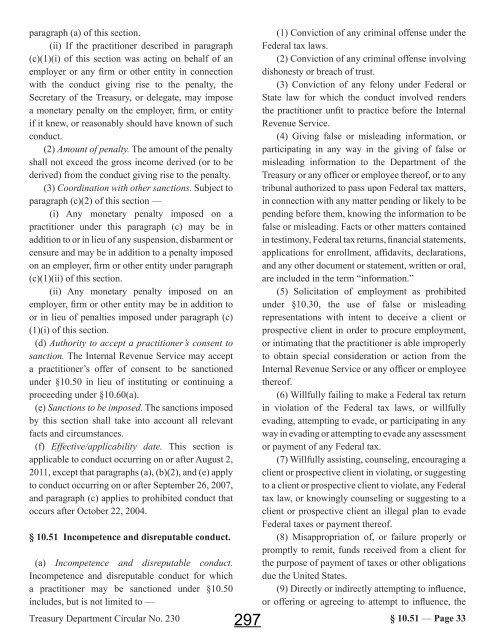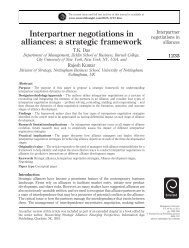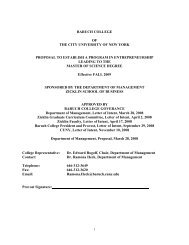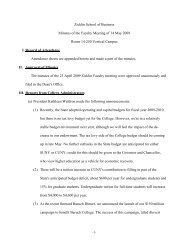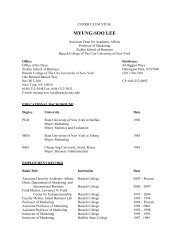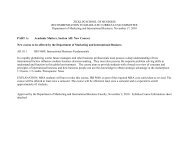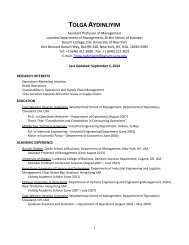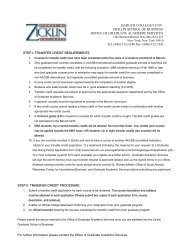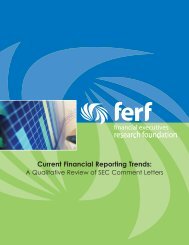Tax Seminar #3 – December 3 2012
Workbook - Zicklin School of Business
Workbook - Zicklin School of Business
You also want an ePaper? Increase the reach of your titles
YUMPU automatically turns print PDFs into web optimized ePapers that Google loves.
paragraph (a) of this section.<br />
(ii) If the practitioner described in paragraph<br />
(c)(1)(i) of this section was acting on behalf of an<br />
employer or any firm or other entity in connection<br />
with the conduct giving rise to the penalty, the<br />
Secretary of the Treasury, or delegate, may impose<br />
a monetary penalty on the employer, firm, or entity<br />
if it knew, or reasonably should have known of such<br />
conduct.<br />
(2) Amount of penalty. The amount of the penalty<br />
shall not exceed the gross income derived (or to be<br />
derived) from the conduct giving rise to the penalty.<br />
(3) Coordination with other sanctions. Subject to<br />
paragraph (c)(2) of this section —<br />
(i) Any monetary penalty imposed on a<br />
practitioner under this paragraph (c) may be in<br />
addition to or in lieu of any suspension, disbarment or<br />
censure and may be in addition to a penalty imposed<br />
on an employer, firm or other entity under paragraph<br />
(c)(1)(ii) of this section.<br />
(ii) Any monetary penalty imposed on an<br />
employer, firm or other entity may be in addition to<br />
or in lieu of penalties imposed under paragraph (c)<br />
(1)(i) of this section.<br />
(d) Authority to accept a practitioner’s consent to<br />
sanction. The Internal Revenue Service may accept<br />
a practitioner’s offer of consent to be sanctioned<br />
under §10.50 in lieu of instituting or continuing a<br />
proceeding under §10.60(a).<br />
(e) Sanctions to be imposed. The sanctions imposed<br />
by this section shall take into account all relevant<br />
facts and circumstances.<br />
(f) Effective/applicability date. This section is<br />
applicable to conduct occurring on or after August 2,<br />
2011, except that paragraphs (a), (b)(2), and (e) apply<br />
to conduct occurring on or after September 26, 2007,<br />
and paragraph (c) applies to prohibited conduct that<br />
occurs after October 22, 2004.<br />
§ 10.51 Incompetence and disreputable conduct.<br />
(a) Incompetence and disreputable conduct.<br />
Incompetence and disreputable conduct for which<br />
a practitioner may be sanctioned under §10.50<br />
includes, but is not limited to —<br />
Treasury Department Circular No. 230<br />
297<br />
(1) Conviction of any criminal offense under the<br />
Federal tax laws.<br />
(2) Conviction of any criminal offense involving<br />
dishonesty or breach of trust.<br />
(3) Conviction of any felony under Federal or<br />
State law for which the conduct involved renders<br />
the practitioner unfit to practice before the Internal<br />
Revenue Service.<br />
(4) Giving false or misleading information, or<br />
participating in any way in the giving of false or<br />
misleading information to the Department of the<br />
Treasury or any officer or employee thereof, or to any<br />
tribunal authorized to pass upon Federal tax matters,<br />
in connection with any matter pending or likely to be<br />
pending before them, knowing the information to be<br />
false or misleading. Facts or other matters contained<br />
in testimony, Federal tax returns, financial statements,<br />
applications for enrollment, affidavits, declarations,<br />
and any other document or statement, written or oral,<br />
are included in the term “information.”<br />
(5) Solicitation of employment as prohibited<br />
under §10.30, the use of false or misleading<br />
representations with intent to deceive a client or<br />
prospective client in order to procure employment,<br />
or intimating that the practitioner is able improperly<br />
to obtain special consideration or action from the<br />
Internal Revenue Service or any officer or employee<br />
thereof.<br />
(6) Willfully failing to make a Federal tax return<br />
in violation of the Federal tax laws, or willfully<br />
evading, attempting to evade, or participating in any<br />
way in evading or attempting to evade any assessment<br />
or payment of any Federal tax.<br />
(7) Willfully assisting, counseling, encouraging a<br />
client or prospective client in violating, or suggesting<br />
to a client or prospective client to violate, any Federal<br />
tax law, or knowingly counseling or suggesting to a<br />
client or prospective client an illegal plan to evade<br />
Federal taxes or payment thereof.<br />
(8) Misappropriation of, or failure properly or<br />
promptly to remit, funds received from a client for<br />
the purpose of payment of taxes or other obligations<br />
due the United States.<br />
(9) Directly or indirectly attempting to influence,<br />
or offering or agreeing to attempt to influence, the<br />
§ 10.51 — Page 33


